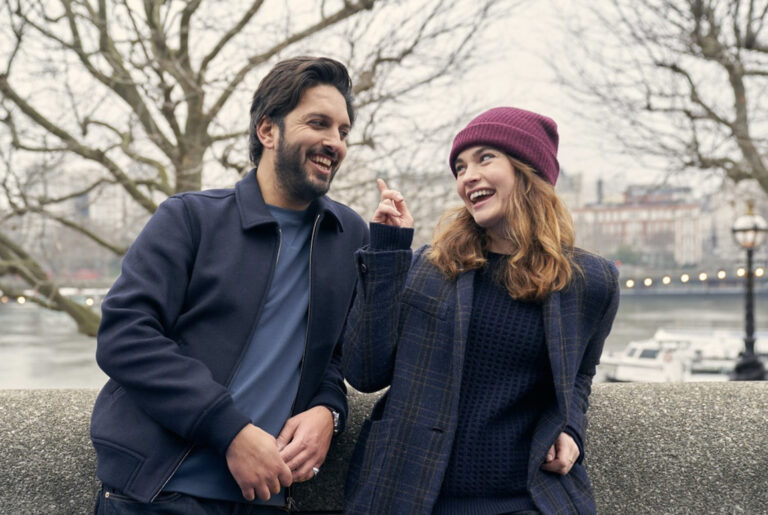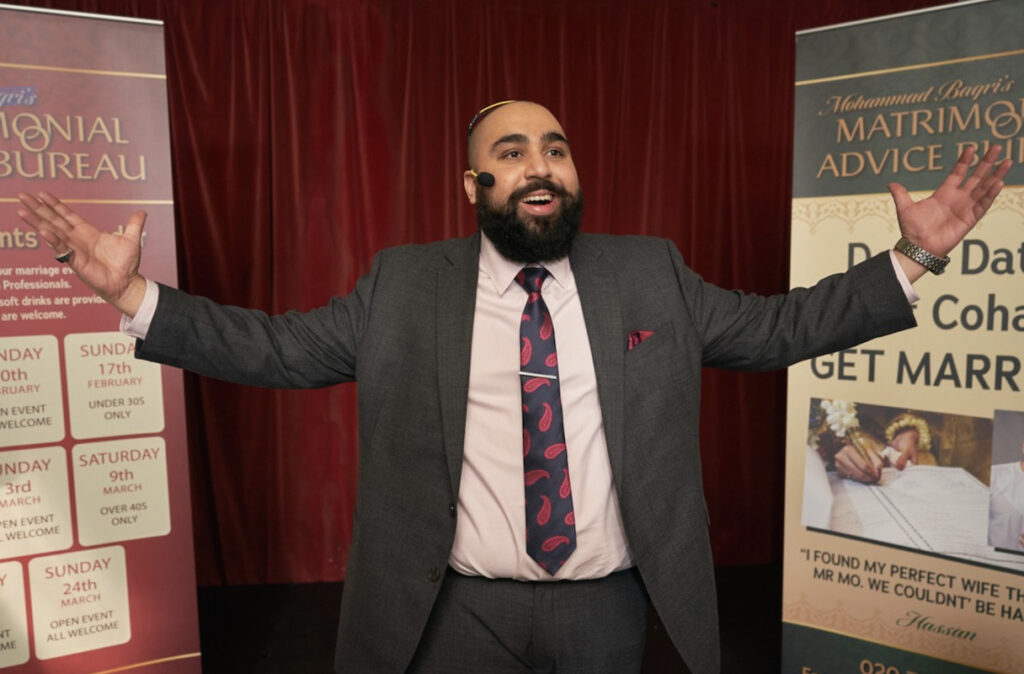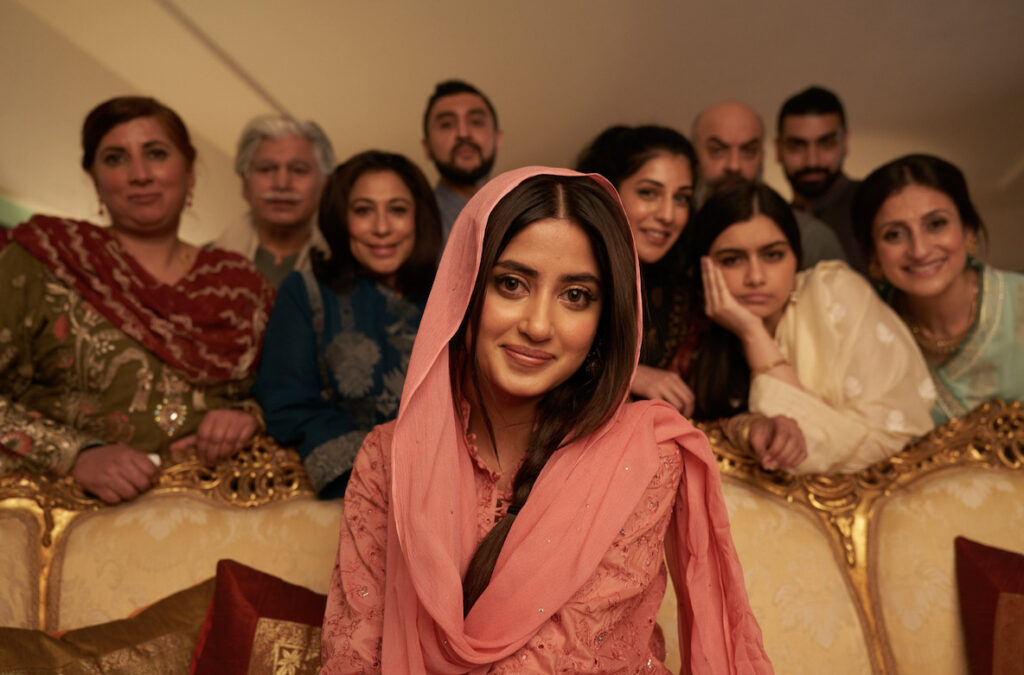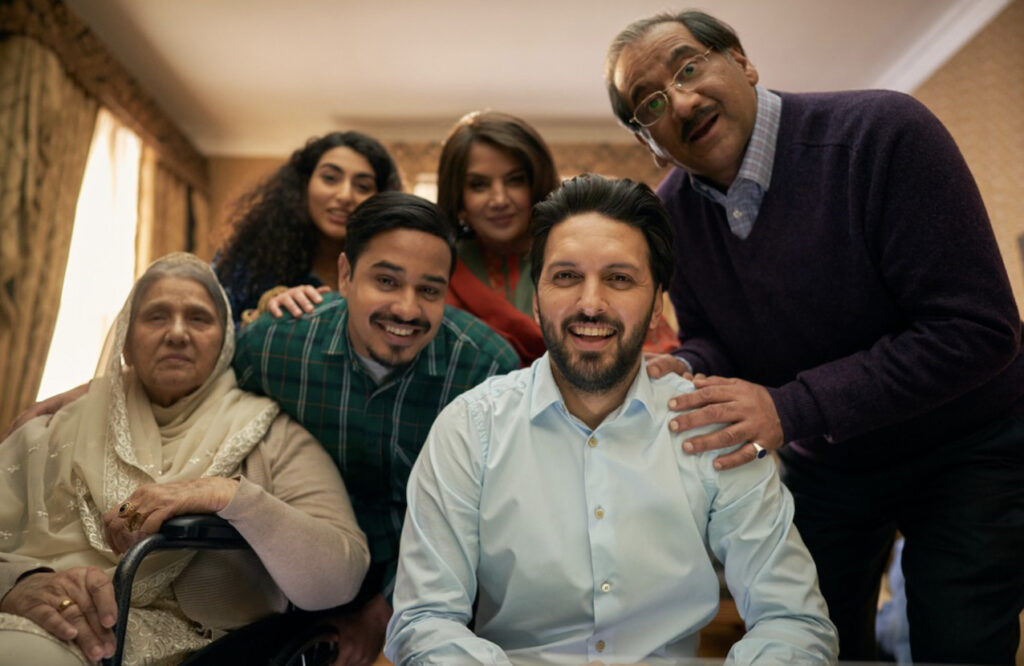
Synopsis : How do you find lasting love in today’s world? For documentary-maker and dating app addict Zoe (Lily James), swiping right has only delivered an endless stream of Mr. Wrongs, to her eccentric mother Cath’s (Emma Thompson) dismay. For Zoe’s childhood friend and neighbor Kaz (Shazad Latif), the answer is to follow his parents’ example and opt for an arranged (or “assisted”) marriage to a bright and beautiful bride from Pakistan. As Zoe films his hopeful journey from London to Lahore to marry a stranger, chosen by his parents, she begins to wonder if she might have something to learn from a profoundly different approach to finding love.
Rating: PG-13 (Some Suggestive Material|Brief Drug Material|A Sexual Reference|Strong Language)
Genre: Romance, Comedy
Original Language: English
Director: Shekhar Kapur
Producer: Nicky Kentish Barnes, Tim Bevan, Erci Feller.
Writer: Jemima Khan
Release Date (Theaters): Limited
Runtime:
Distributor: SHOUT! STUDIOS
Production Co: StudioCanal, Instinct Productions, Working Title Films

Photo by Photo Credit: Robert Viglasky/Robert Viglasky – © StudioCanal
Exclusive Interview with Shekhar Kapur
Q: Screenwriter producer Jemima Khan used to live in Pakistan for 10 years — between the ‘20s to the ‘30s. What was your fascination about this script that motivated you to tackle this project? It seems quite different from your previous work.
SK: My previous work in the West — not in India — has always been in historicals. This is my first film that I’ve tackled [which is] contemporary. If I did a contemporary film, I wanted to tackle something that has been me trying to understand something and to understand the way we search for love. For all of us, the search for love and intimacy is timeless. But with dating apps, women now have the power to decide which way to go.
They can say yes to this man, no to that man — suddenly they have a choice. I’m just fascinated by what you do when you have a complete choice. How do you handle choice now that you’ve got so much choice in the whole shuffling of the cards? Suddenly, somewhere in this, you can find the person you’re supposed to be with. What I loved about the script is that [she’s] confronted by a best friend who says, “Well, I’m going to choose no choice.” But what are you doing with choice and no choice? You’re looking at the most fundamental thing in life itself — intimacy and love.
Q: Did you have a preconceived notion about arranged marriage when you were growing up in India? How is it different now in England?
SK: When we say arranged or assisted marriage in the song It’s not just in India. My first marriage was arranged, but it was arranged by friends. In England, the US or in Canada, anywhere, they do it. Friends would say, why is Shekhar single and so and so is single? I think they’ll make a great couple. Let’s get them going. What else is blind date when your friends put you in one? It’s assisting. In every culture it is there. I still remember one of my all-time favorite films, “My Big Fat Greek Wedding” — what was that?
That was parents thinking that they know best or are trying to do their best and fear a different culture. It’s all over the world, this idea of somehow assisting people to get together.
That’s one of the things that I found when I did the film. When I did my cast and crew screening, three young guys came to me — one was Scottish, another was Spanish and another was very British.
I said, “My god, the grandmother and my grandma are exactly like that. I’m saying, “When you say India, yeah, but it’s not that different, even in modern times. Originally, years ago, it used to be because marriage was an arrangement between two families, weaving them together. Now we don’t.
Now it’s an individual who has carried the burden. Now we live as individuals. We don’t live in these large joint families anymore. So it’s become a different thing. How do you choose your partner; how will you find someone? Will you still find a partner between families? No, but you still have to get married in India or both of you go off to New York to live there. Now what do you do?
Q: The statistic in this movie was surprising: the divorce rate in England is more than 50%, but with arranged marriage it is only like 6%. Do you think that arranged marriage has a lower divorce rate because it’s already passed the judgment of the parents or because it’s set up by the parents? Or is it that you can’t easily divorce because the family is in the background?
SK: When it’s set up by the parents and two people, there is a whole support structure of families around you. They’re there to absorb the stresses and strains of two people living together. They’ll absorb it because when it’s arranged, it’s between families. On the other hand, if you want to separate, it’s all structured.
It’s not that easy just to walk out of it. That’s the part of the reason first it’s an asset and then second sometimes it’s not that easy to get divorced. Not because it’s not allowed, it’s because the whole community will, the community gets involved. That’s what happened. So we talk a lot about the community in the film which gets involved in holding marriages and families together.

Q: What was the process of casting Lily James and Shazad Latif? They’re really good friends in real life as well. They seem to have a really good chemistry.
What was the process of casting her and Emma Thompson as the mother, who really embodies motherhood here.
SK: We always had Lily James and I talked about her. We started casting this film during the pandemic. I was up in the mountains near the Tibetan border photographing glaciers. Lily was in London and we had never met. We started to converse with each other on WhatsApp. For two or three months, Lily and I converged on one single point — what do you think love really is?
What do you think intimacy really is? What is it all about? Then, when we met, she agreed to do the film, but the conversations were less about the script. Of course they were about the script but later, they were about what are the fundamental themes of the film — do we all agree on the fundamental themes? Lily came on, read the script, and then Kaz Shazad did an audition for me.
I found in him a certain stillness, the ability to be completely still. When I spoke to Lily, I said, “Well, it seems to me that Zoe is in a tumble riot.” I needed to contradict that with someone who said, “I know everything.” I needed that character to be completely still. Shazad has this amazing stillness about him, a kind of gravitas that contradicts Lily’s. Like, I don’t know what to do. I know what to do. I’ll do nothing. So you start believing him because he’s still and has that self-described gravitas. Then he turns out to be wrong, too.
It wasn’t difficult to cast these two ones.
And Shabana, as Aisha, the mother, she did my first movie ever. I’ve known her since then. She’s one of the best actors, that’s part of her. Amazing. And of course, Maymouna, the Pakistani girl. I hadn’t known her. I just met her through auditions. What was beautiful about her, she looked so vulnerable, like a little gentle flower. She looks like, okay, she’ll do anything that her parents want her to do. Yet when I was doing our audition, I found there in her eyes, a certain rebellion [as well].
Q: Which is really depicted in the film.
SK: Yeah, and that rebellion.. I thought I could play with that so that when you realize that there’s a different person hiding in there, coming out gradually and rebelling. It was always there if you look at the film again. It’s there in your eyes, always.
Q: That’s so true. As for Emma Thompson…
SK: Emma is both a director and an actor. She did her own costumes, you know. And it’s Emma’s interpretation of the character. She realized she has to play her in such a way that somebody is constantly getting it wrong, but you’re constantly forgiving her because of the way she plays it. Kaz is so good looking that he almost doesn’t look Muslim, but looks Greek.
She just says it, you know, but she says it so innocently, that, in essence, she throws it away. She throws her lines so brilliantly that you kind of say, “Okay, she’s just misled,” but you love her for her innocence. She doesn’t realize what she’s saying; she doesn’t mean any ill will. She loves them, but she talks like that’s it. It’s her way of discovery. What Emma did in this film, she brought to it everything we needed. I used to call it a chutney in an Indian food pali. Every now and again the chutney has to come in, the spice that comes in at the right time — she’s the spice of the film.

Q: Even though you’ve worked out of Bollywood for quite a long time, how do you view the current success of a movie like “R.R.R.”? How different is Bollywood now compared to when you started?
SK: It’s not that different. But what is, is that it’s unabashed. You remember when “Crouching Tiger, Hidden Dragon” came out? It was like, “Okay, hang on. These people are flying from one tree to another. How does that happen and how do I accept it?” I accept it because I love it. In a way, “R-R-R” does the same thing. You know when Marvel does these action films, they joke about it a bit. That’s how it is. It’s unabashed Bollywood.
In a way, it’s unabashed Indian mythology. That’s how we see life, in an unabashed dramatic, mystic way. In Eastern cultures, people call it melodramatic. I said, “No, it’s not that’s mythic — completely melodramatic. But we’re a melodramatic people and culture. We think that every event in our lives is God-given and is supposed to be treated as such — like you say, melodramatic. Love, death, betrayal, friendship… All of these [notions] are treated in such a mythic way that people loved the film.
Q: That’s so true. As to this character, the matchmaker… When the Khan family comes to visit, the whole family has its own idea of the cousin’s wife. It’s really about status, the company that this woman works for, or how much money they have. There are the different perspectives that family presents in the matchmaker sequences. Talk about creating that exchange with the family together all at the same time.
SK: I didn’t know the actor, but I remember somebody said, “Oh, isn’t that the guy in the British Airways ad?” That’s when I first saw him and thought, “My God, that guy’s so funny. He’s so good. Then he just says it with a plain face and does that. When I met him, we talked about that. Each person of the family comes from like Jeff, who played the father.
He’s more traditional and hasn’t changed since he came to the west. He’s constantly talking about Islam. His mother is grown, The mother understands that she belongs to another culture but she doesn’t give up. She’s the one who says, “Mmm, maybe a little brown but not too white and not too this.” These are words I’ve heard from people when they look at marriage. I come from Northern India where everybody’s a little fairer, and I remember from my mother, her saying, “Isn’t she a little dark, Shekhar?” I’m Indian, hang on, we’re all Indians.
It doesn’t matter if she’s dark, but some Indians are fairer. It’s not just color is not just a thing between different species of human beings. Color is a thing that’s graded. “Oh, she’s quite white, you know?” “She’s quite brown.” You picked up something that nobody’s ever said. That’s very interesting.
Q: After the sequel of Elizabeth, it’s been quite a long time since you tackled a feature project. You mentioned that you visited Tibet recently. Why did you take so much time to make another feature? Were you pursuing another career path or other things you wanted to do? What have you been doing over the last 15 years?
SK: Well I got very involved with environmentalism a lot and that suddenly became such a big thing. I went to shoot retreating glaciers. That’s one thing I do and, of course, did in between two TV series including a big one on the life of young William Shakespeare. We know where he was born and what he left behind and we knew him when he became famous. But what happened in between? Who was he and how did he become William Shakespeare?
I said, “Okay, here’s the thing, Shakespeare’s language at that time was street language. We now think it’s like… We treat it as “Shakespearean,” but it wasn’t in his day. If Shakespeare was born today, he’d be a rap artist. That’s how I started. I was doing musical theater all over, doing my environmental work and I was teaching. When I came back to this film, I had to find a film’s through line. What is it that I’m really attracted to? What do I want to say? Shakespeare would have been a rap artist. Then I knew what to do.

Q: Speaking of Shakespeare as a rap artist, this soundtrack by Naughty Boy is interesting. Can you talk about the selection of music there on the soundtrack.
SK: Naughty Boy is very cool and we knew we needed an Indian soundtrack. He’s from Pakistan and we worked and he got Rahat Fateh Ali Khan to sing for it. Rahat is probably the most famous Sufi singer in the world. I knew him as a kid because I worked with his uncle, Nusrat Fateh Ali Khan, who was called the voice of the century. And he does the score and music for “Bandit Queen” [Shekur’s 1994 Indian Hindi-language action-adventure biopic based on Phoolan Devi’s life].
So that’s how I knew Rahat as a little kid. When I asked him to come [on board], he came and acted in it. He really did brilliantly. He brought passion to his performance, so much passion when he was singing. When Lily and Shazad, we’re standing there and Lilly’s listening, you can see her eyes glisten with tears because the essence of Sufi love got into her. I was very proud of Rahat and we’ known each other for years. It was great to have him on the screen.
Q: What do you want audiences to take away from this romantic comedy?
SK: At that time when we were filming, we were in the middle of COVID and people were dying in ambulances. Every day that I shot, it was a gift because I didn’t know if we could go down, or the actors could go down — we could be stopped shooting because of COVID [at any time]. I knew that at the end of this, when the film comes out, people want to hug each other. People want to go back to their families. I kept telling myself and my editor that that’s what will happen. If you can come up with a film that gets audiences to go back and recognize the ideal family, to recognize the idea of hugging and loving again, then maybe COVID’s taught us that lesson. That’s one of the things that I hope for.
The other thing is, can I make this film for every culture in the world? I don’t want people to come out saying, “Well that was about Asian culture.” When I had my cast and crew screening, three of my crew came up — one was Scottish, one Spanish, and the other very British — and they said, “That grandmother! She’s exactly like my grandmother.” Okay, hang on. Which grandmother?
You’re talking about a Scottish grandmother, right? She’s exactly like that. That’s one thing I wanted, but that’s so much the way the actors are, because when the performances are real, you see yourself in the performance. One of the things that I do with all my actors normally is encourage them in our workshops to find the characters inside yourself. When that happens and they come up on screen, they look so real that you can go through the person into finding yourself in there. And that happened. These are the two things I really wanted. At the end of it, come out with a smile on your face, a dry tear on your cheek and you want to go hug someone.
Check out more of Nobuhiro’s Articles.
Here’s the trailer of the film.

